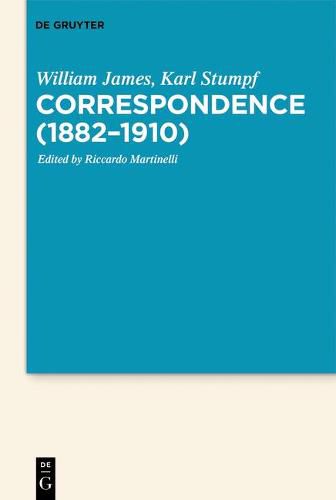Readings Newsletter
Become a Readings Member to make your shopping experience even easier.
Sign in or sign up for free!
You’re not far away from qualifying for FREE standard shipping within Australia
You’ve qualified for FREE standard shipping within Australia
The cart is loading…






James and Stumpf first met in Prague in 1882. James soon started corresponding with a colleague with whose persons and whose ideas alike I feel so warm a sympathy. With this, a lifelong epistolary friendship began. For 28 years until James’s death in 1910, Stumpf became James’s most important European correspondent.
Besides psychological themes of great importance, such as the perception of space and of sound, the letters include commentary upon Stumpf’s (Tonpsychologie) and James’s main books (The Principles of Psychology, The Varieties of Religious Experience), and many other works. The two friends also exchange views concerning other scholars, religious faith and metaphysical topics. The different perspectives of the American and the German (European) way of living, philosophizing and doing science are frequently under discussion. The letters also touch upon personal questions of historical interest.
The book offers a critical edition and the English translation of hitherto unpublished primary sources. Historians of psychology and historians of philosophy will welcome the volume as a useful tool for their understanding of some crucial developments of the time. Scholars in the history of pragmatism and of phenomenology will also be interested in the volume.
$9.00 standard shipping within Australia
FREE standard shipping within Australia for orders over $100.00
Express & International shipping calculated at checkout
Stock availability can be subject to change without notice. We recommend calling the shop or contacting our online team to check availability of low stock items. Please see our Shopping Online page for more details.
James and Stumpf first met in Prague in 1882. James soon started corresponding with a colleague with whose persons and whose ideas alike I feel so warm a sympathy. With this, a lifelong epistolary friendship began. For 28 years until James’s death in 1910, Stumpf became James’s most important European correspondent.
Besides psychological themes of great importance, such as the perception of space and of sound, the letters include commentary upon Stumpf’s (Tonpsychologie) and James’s main books (The Principles of Psychology, The Varieties of Religious Experience), and many other works. The two friends also exchange views concerning other scholars, religious faith and metaphysical topics. The different perspectives of the American and the German (European) way of living, philosophizing and doing science are frequently under discussion. The letters also touch upon personal questions of historical interest.
The book offers a critical edition and the English translation of hitherto unpublished primary sources. Historians of psychology and historians of philosophy will welcome the volume as a useful tool for their understanding of some crucial developments of the time. Scholars in the history of pragmatism and of phenomenology will also be interested in the volume.